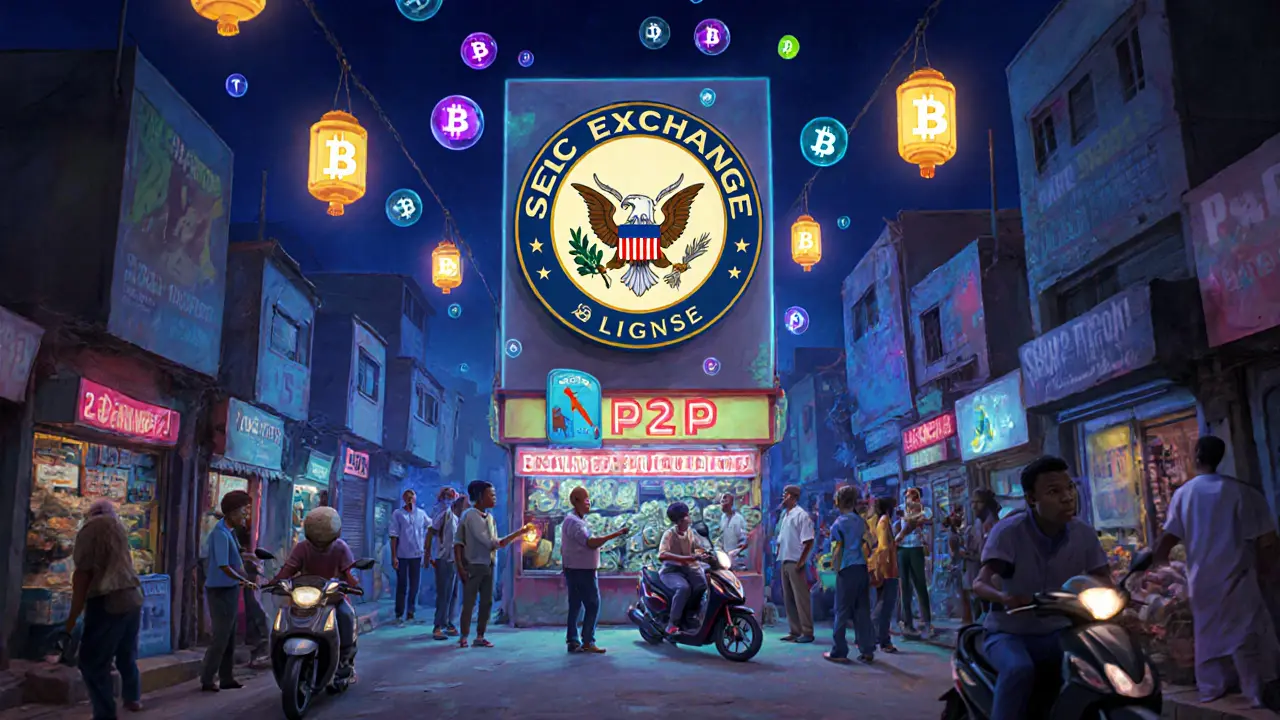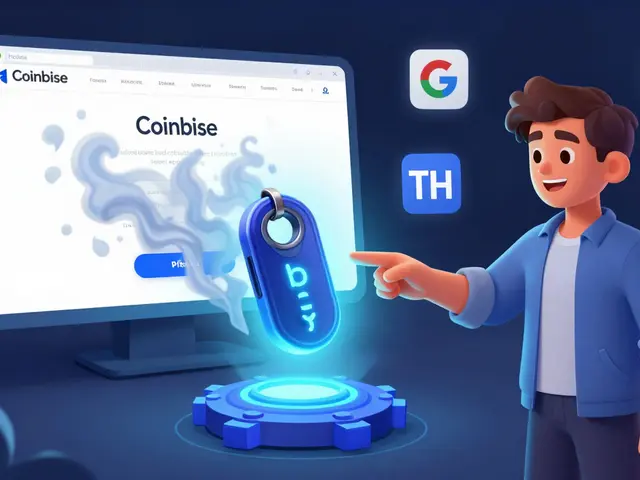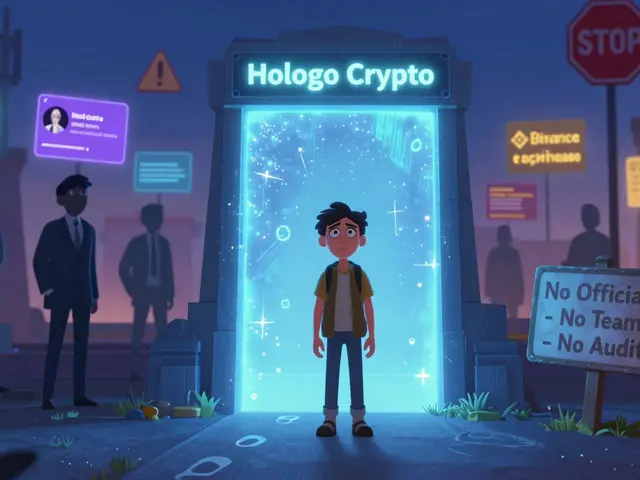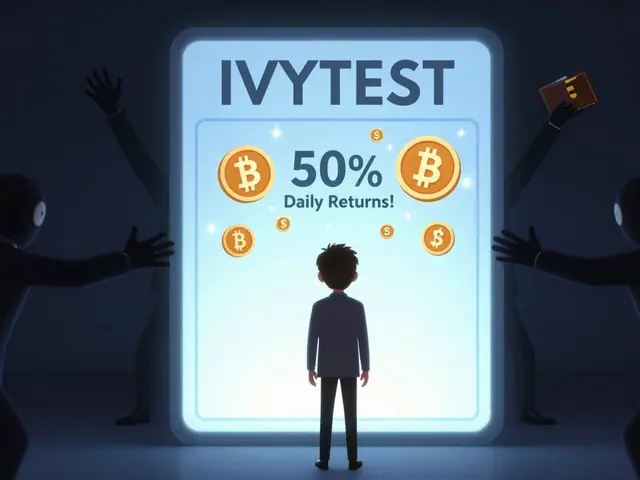Nigeria Crypto License Checker
Verify Crypto Platform License Status
Check if a crypto exchange or service provider is legally licensed by Nigeria's Securities and Exchange Commission (SEC) under the VASP Guidelines. All licensed platforms are listed in our official registry.
How It Works
Under Nigeria's 2023 VASP Guidelines, all crypto exchanges and service providers must be licensed by the SEC. Platforms operating without SEC authorization are at risk of being blocked by banks and face legal consequences.
Why This Matters
Licensed platforms offer essential protections: buyer protection, dispute resolution, secure KYC/AML compliance, and regulatory oversight. Unlicensed platforms carry high risks of scams, funds freezing, and legal action.
Back in 2021, if you were caught trading Bitcoin in Nigeria, your bank account could be shut down overnight. No warning. No appeal. Just frozen funds and a message from your bank saying they couldn’t touch crypto-related transactions. That was the reality for millions of Nigerians who used cryptocurrency not as a speculative asset, but as a lifeline - especially when banks refused to process payments during the #EndSARS protests. What followed wasn’t silence. It was a quiet revolution.
The First Warning: 2017’s Circular
The Central Bank of Nigeria didn’t start with a ban. In January 2017, it issued a circular telling banks and financial institutions: don’t touch cryptocurrency. Not because it was illegal, but because it was too risky. The CBN warned that virtual currencies could be used for money laundering, fraud, and terror financing. Banks were told to avoid opening accounts for crypto exchanges and to monitor existing customers closely.
This wasn’t a law. It didn’t make owning Bitcoin a crime. It just cut off the pipeline. If you wanted to buy crypto, you couldn’t use your GTBank or Access Bank account. You had to find someone with cash, meet in a parking lot, or use peer-to-peer platforms. The CBN didn’t outlaw crypto - it outlawed banks from helping you use it.
The Crackdown: 2021’s Letter
Four years later, the CBN went further. On February 5, 2021, it sent a letter to all deposit money banks and financial institutions: close any account linked to cryptocurrency. No exceptions. If you ran a crypto exchange, your account was shut. If you were a trader who deposited crypto earnings, your account was flagged. Banks had 48 hours to comply.
The result? Nigeria’s crypto market didn’t collapse - it went underground. Peer-to-peer trading exploded. Platforms like Paxful and LocalBitcoins became the new banks. Nigerians started using USDT (Tether) to send money across borders, pay for imports, and even buy groceries. In 2020, Nigeria ranked second globally in crypto adoption by volume, according to Chainalysis. The ban didn’t stop people. It just made them more creative.
And then came the real test. During the #EndSARS protests, the government froze bank accounts of activists. Many lost access to their life savings. But those who had Bitcoin or USDT? They kept receiving donations from around the world. Crypto became a tool of resistance. The CBN couldn’t control what happened on decentralized networks. That’s when the government realized: you can’t ban what doesn’t need a bank.
The Dual Regulators: CBN vs SEC
While the CBN was pushing crypto out of the banking system, another agency was watching closely. The Securities and Exchange Commission (SEC) noticed something: some digital assets weren’t just currencies. They were investments. Tokens sold in initial coin offerings (ICOs) promised returns. That made them securities under Nigeria’s Investments and Securities Act of 2007.
In September 2020, the SEC issued its first statement on digital assets - and it was clear: if it acts like a security, it’s regulated like one. This created a strange situation. The CBN said: no banks. The SEC said: if you’re selling tokens, you need a license. Two agencies. Two rules. No coordination.
By 2022, the confusion was costing Nigeria. Investors hesitated. Exchanges fled. OKX pulled out in July 2024, citing "recent changes in local laws." Binance removed the naira from its platform. Two of its executives were detained over untraceable fund flows. Nigeria’s crypto scene was in freefall.

The Turning Point: December 2023
Everything changed in December 2023. The CBN dropped a bombshell: Virtual Asset Service Provider (VASP) Guidelines.
For the first time, the CBN said banks could legally open accounts for crypto businesses - if those businesses were licensed by the SEC. No more hiding. No more gray zones. If you wanted to run a crypto exchange, wallet, or trading platform in Nigeria, you had to register with the SEC, follow strict KYC rules, and prove your anti-money laundering controls were solid.
This wasn’t a surrender. It was a takeover. The CBN stopped trying to block crypto. It started trying to control it.
The New Rules: SEC’s Digital Assets Rules (2025)
The shift got teeth in 2025 with the passage of the Investments and Securities Act 2025. For the first time, Nigerian law formally recognized cryptocurrencies as securities when they meet certain criteria. The SEC now has clear authority to license, audit, and penalize crypto firms.
Under the new rules:
- All crypto exchanges must be licensed by the SEC
- Every user must pass KYC verification
- Transaction records must be kept for at least five years
- AML controls must match global standards
The goal? Remove Nigeria from the Financial Action Task Force’s (FATF) Gray List. The country had been on it since 2019 for weak anti-money laundering controls. Crypto had become a blind spot. Now, with regulated exchanges tracking every transaction, Nigeria has a real shot at getting off the list by late 2025.

What This Means for Nigerians Today
Today, if you want to trade crypto in Nigeria, you have options - but they’re not free. You can use licensed platforms like Yellow Card, NairaEx, or Binance (which quietly relaunched its naira trading in early 2025 under SEC oversight). You can still do P2P trades, but they’re riskier. No buyer protection. No dispute resolution.
Banks are back in the game. You can now deposit naira into a licensed exchange and withdraw profits without fear of account closure. But here’s the catch: the SEC monitors every transfer. If you’re sending large sums to unknown wallets, you’ll get flagged. The system isn’t perfect, but it’s transparent.
And the economy is responding. Foreign investors are returning. In Q2 2025, crypto inflows into Nigeria rose 147% compared to the same period in 2024. Nigerian startups building blockchain tools for agriculture, logistics, and remittances are getting funding. The government is no longer afraid of crypto - it’s trying to harness it.
Why the Shift? The Real Reason
It’s not about technology. It’s about control.
The CBN tried to ban crypto because it threatened its power. If people could send money without going through banks, the central bank lost visibility. It couldn’t track capital flight. It couldn’t control the naira’s value. But as crypto use grew, the cost of the ban became too high: lost tax revenue, brain drain, and a damaged global reputation.
By 2025, the CBN realized: you don’t stop a river by building a wall. You build a dam. You control the flow. So now, Nigeria has a regulated crypto market - one that answers to the SEC, monitored by the CBN, and aligned with global standards.
The evolution wasn’t about embracing freedom. It was about reclaiming authority. And for Nigeria, that’s the only kind of crypto policy that lasts.
Is cryptocurrency legal in Nigeria today?
Yes, but only if you use SEC-licensed platforms. Owning Bitcoin or Ethereum isn’t illegal. Trading through unregulated P2P markets is risky but not banned. However, banks can only legally process crypto transactions for firms that hold a valid VASP license from the SEC.
Can I open a bank account for my crypto business in Nigeria?
Only if your business is licensed by the SEC as a Virtual Asset Service Provider (VASP). Once licensed, you can open a corporate bank account with any Nigerian deposit money bank. The CBN now explicitly permits this under its 2023 VASP Guidelines. Unlicensed businesses will still be denied service.
Why did Binance and OKX leave Nigeria?
They left during the 2021-2023 crackdown when the CBN blocked all bank access to crypto firms. Without banking services, they couldn’t process naira deposits or withdrawals. OKX cited "recent changes in local laws" as the reason for exiting in 2024. Binance removed naira trading but returned in early 2025 after the SEC introduced its licensing framework, allowing compliance.
What’s the role of the SEC versus the CBN now?
The SEC regulates crypto businesses as securities or financial services providers. It issues licenses, enforces KYC/AML rules, and audits platforms. The CBN oversees banks and payment systems. It ensures banks only serve SEC-licensed entities. The two agencies now work together under a formal inter-agency framework to prevent money laundering and maintain financial stability.
Can I still use P2P crypto trading in Nigeria?
Yes, P2P trading is still common and not illegal. Many Nigerians use platforms like Paxful and Binance P2P to buy and sell crypto with cash or mobile money. However, these trades carry higher risk - no buyer protection, no recourse if scammed. The government encourages users to move to licensed exchanges for safety and legal protection.
Will Nigeria get off the FATF Gray List?
It’s likely. Nigeria has been on the FATF Gray List since 2019 due to weak AML controls. The new SEC crypto regulations, with mandatory KYC, transaction tracking, and reporting, are designed to close those gaps. If fully implemented by mid-2025, Nigeria has a strong chance of being removed from the list by the FATF’s next review in October 2025.







Write a comment